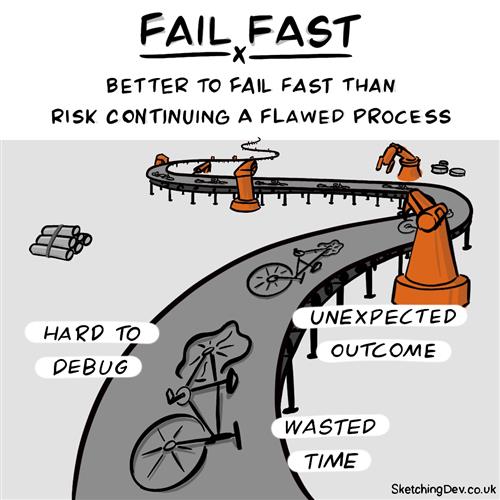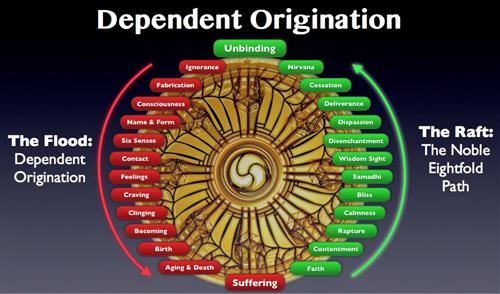What are common mistakes that new or inexperienced managers make?
Published on: May 22, 2022
Last updated: December 08, 2022 Read in fullscreen view
Last updated: December 08, 2022 Read in fullscreen view
- 01 Aug 2024
 The Standish Group report 83.9% of IT projects partially or completely fail 339/2058
The Standish Group report 83.9% of IT projects partially or completely fail 339/2058 - 13 Apr 2024
 Lessons on Teamwork and Leadership from Chinese story book "Journey to the West" 81/1084
Lessons on Teamwork and Leadership from Chinese story book "Journey to the West" 81/1084 - 28 Oct 2023
 The GOLDEN Rules of Software Engineering 47/593
The GOLDEN Rules of Software Engineering 47/593 - 02 Nov 2021
 What is Terms of Reference (ToR)? 46/1564
What is Terms of Reference (ToR)? 46/1564 - 13 Oct 2021
 Outsourcing Software Development: MVP, Proof of Concept (POC) and Prototyping. Which is better? 40/486
Outsourcing Software Development: MVP, Proof of Concept (POC) and Prototyping. Which is better? 40/486 - 18 Oct 2020
 How to use the "Knowns" and "Unknowns" technique to manage assumptions 38/1089
How to use the "Knowns" and "Unknowns" technique to manage assumptions 38/1089 - 12 Oct 2022
 14 Common Reasons Software Projects Fail (And How To Avoid Them) 31/567
14 Common Reasons Software Projects Fail (And How To Avoid Them) 31/567 - 14 Oct 2021
 Stream Story - Low land stream or fast moving stream? 30/633
Stream Story - Low land stream or fast moving stream? 30/633 - 19 Oct 2021
 Software development life cycles 29/701
Software development life cycles 29/701 - 01 Sep 2022
 Facts Chart: Why Do Software Projects Fail? 29/596
Facts Chart: Why Do Software Projects Fail? 29/596 - 03 Apr 2022
 Microsoft Solutions Framework (MSF) 29/1273
Microsoft Solutions Framework (MSF) 29/1273 - 13 Oct 2021
 What is Bug Convergence? Why is it important for User Acceptance Testing (UAT)? 28/759
What is Bug Convergence? Why is it important for User Acceptance Testing (UAT)? 28/759 - 08 Dec 2021
 What Are The 4 Types of Maintenance Strategies? 25/1146
What Are The 4 Types of Maintenance Strategies? 25/1146 - 01 Oct 2020
 Fail fast, learn faster with Agile methodology 24/1047
Fail fast, learn faster with Agile methodology 24/1047 - 05 May 2021
 TIGO Magic Scale - PoC tool for you to apply dichotomous thinking before submitting RFP 24/343
TIGO Magic Scale - PoC tool for you to apply dichotomous thinking before submitting RFP 24/343 - 14 Oct 2021
 Advantages and Disadvantages of Time and Material Contract (T&M) 22/864
Advantages and Disadvantages of Time and Material Contract (T&M) 22/864 - 13 May 2022
 IT Training and Development: The most effective options for upskilling IT staff 21/1146
IT Training and Development: The most effective options for upskilling IT staff 21/1146 - 02 Dec 2022
 3 Levels of Quality in KANO Analysis Model 21/1120
3 Levels of Quality in KANO Analysis Model 21/1120 - 18 Aug 2022
 What are the consequences of poor requirements with software development projects? 20/274
What are the consequences of poor requirements with software development projects? 20/274 - 13 Dec 2020
 Move fast, fail fast, fail-safe 20/323
Move fast, fail fast, fail-safe 20/323 - 06 Feb 2021
 Why fail fast and learn fast? 19/450
Why fail fast and learn fast? 19/450 - 16 Apr 2021
 Insightful Business Technology Consulting at TIGO 18/412
Insightful Business Technology Consulting at TIGO 18/412 - 03 Dec 2025
 IT Outsourcing Solutions Explained: What, How, Why, When 18/40
IT Outsourcing Solutions Explained: What, How, Why, When 18/40 - 07 Oct 2025
 Case Study: Using the “Messaging House” Framework to Build a Digital Transformation Roadmap 17/86
Case Study: Using the “Messaging House” Framework to Build a Digital Transformation Roadmap 17/86 - 05 Sep 2023
 The Cold Start Problem: How to Start and Scale Network Effects 17/203
The Cold Start Problem: How to Start and Scale Network Effects 17/203 - 18 Dec 2023
 The Cone of Uncertainty in Scrum & Requirement Definition 17/701
The Cone of Uncertainty in Scrum & Requirement Definition 17/701 - 01 Mar 2023
 Bug Prioritization - What are the 5 levels of priority? 17/235
Bug Prioritization - What are the 5 levels of priority? 17/235 - 23 Sep 2021
 INFOGRAPHIC: Top 9 Software Outsourcing Mistakes 17/439
INFOGRAPHIC: Top 9 Software Outsourcing Mistakes 17/439 - 04 Oct 2021
 Product Validation: The Key to Developing the Best Product Possible 17/320
Product Validation: The Key to Developing the Best Product Possible 17/320 - 11 Oct 2021
 10 Myths About Low-End Project Management Software 16/340
10 Myths About Low-End Project Management Software 16/340 - 05 Mar 2021
 How do you minimize risks when you outsource software development? 16/336
How do you minimize risks when you outsource software development? 16/336 - 10 Nov 2022
 Poor Code Indicators and How to Improve Your Code? 16/231
Poor Code Indicators and How to Improve Your Code? 16/231 - 31 Aug 2022
 What are the best practices for software contract negotiations? 16/260
What are the best practices for software contract negotiations? 16/260 - 12 Aug 2022
 What is End-to-end project management? 15/444
What is End-to-end project management? 15/444 - 19 Oct 2021
 Is gold plating good or bad in project management? 15/816
Is gold plating good or bad in project management? 15/816 - 07 Aug 2022
 Things to Consider When Choosing a Technology Partner 14/283
Things to Consider When Choosing a Technology Partner 14/283 - 19 Apr 2021
 7 Most Common Time-Wasters For Software Development 14/556
7 Most Common Time-Wasters For Software Development 14/556 - 08 Nov 2022
 4 tips for meeting tough deadlines when outsourcing projects to software vendor 14/291
4 tips for meeting tough deadlines when outsourcing projects to software vendor 14/291 - 26 Sep 2024
 Successful Project Management Techniques You Need to Look Out For 14/401
Successful Project Management Techniques You Need to Look Out For 14/401 - 10 Apr 2024
 The Parking Lot Method: Unlocking a Simple Secret to Supercharge Your Productivity 14/481
The Parking Lot Method: Unlocking a Simple Secret to Supercharge Your Productivity 14/481 - 10 Jul 2025
 Building AI-Driven Knowledge Graphs from Unstructured Data 14/162
Building AI-Driven Knowledge Graphs from Unstructured Data 14/162 - 05 Jun 2023
 Fractional, Part-Time (virtual) or Interim CTO: Who Will Cover Your Business Needs? 13/147
Fractional, Part-Time (virtual) or Interim CTO: Who Will Cover Your Business Needs? 13/147 - 07 Jul 2021
 The 5 Levels of IT Help Desk Support 13/448
The 5 Levels of IT Help Desk Support 13/448 - 28 Jul 2022
 POC, Prototypes, Pilots and MVP: What Are the Differences? 13/697
POC, Prototypes, Pilots and MVP: What Are the Differences? 13/697 - 18 Oct 2021
 Key Elements to Ramping Up a Large Team 13/1198
Key Elements to Ramping Up a Large Team 13/1198 - 08 Oct 2022
 KPI - The New Leadership 12/602
KPI - The New Leadership 12/602 - 31 Oct 2021
 Tips to Fail Fast With Outsourcing 12/392
Tips to Fail Fast With Outsourcing 12/392 - 07 Jul 2022
 Managing Project Execution Terms 12/411
Managing Project Execution Terms 12/411 - 28 Oct 2022
 Build Operate Transfer (B.O.T) Model in Software Outsourcing 12/405
Build Operate Transfer (B.O.T) Model in Software Outsourcing 12/405 - 10 Apr 2021
 RFP vs POC: Why the proof of concept is replacing the request for proposal 12/322
RFP vs POC: Why the proof of concept is replacing the request for proposal 12/322 - 16 Feb 2021
 Choose Outsourcing for Your Non Disclosure Agreement (NDA) 11/173
Choose Outsourcing for Your Non Disclosure Agreement (NDA) 11/173 - 04 Oct 2022
 Which ERP implementation strategy is right for your business? 11/313
Which ERP implementation strategy is right for your business? 11/313 - 03 Nov 2022
 Top questions and answers you must know before ask for software outsourcing 11/292
Top questions and answers you must know before ask for software outsourcing 11/292 - 06 Mar 2021
 4 things you need to do before getting an accurate quote for your software development 11/679
4 things you need to do before getting an accurate quote for your software development 11/679 - 23 Jun 2024
 Best Practices for Managing Project Escalations 11/207
Best Practices for Managing Project Escalations 11/207 - 10 Dec 2023
 Pain points of User Acceptance Testing (UAT) 11/452
Pain points of User Acceptance Testing (UAT) 11/452 - 28 Dec 2021
 8 types of pricing models in software development outsourcing 10/437
8 types of pricing models in software development outsourcing 10/437 - 17 Feb 2022
 Prioritizing Software Requirements with Kano Analysis 10/304
Prioritizing Software Requirements with Kano Analysis 10/304 - 13 Jan 2020
 Quiz: Test your understanding project cost management 10/609
Quiz: Test your understanding project cost management 10/609 - 20 Jul 2022
 Software Myths and Realities 10/891
Software Myths and Realities 10/891 - 14 Jun 2022
 Example and Excel template of a RACI chart in Software Development 10/804
Example and Excel template of a RACI chart in Software Development 10/804 - 06 Jun 2022
 Change Management at the Project Level 10/309
Change Management at the Project Level 10/309 - 02 May 2022
 What Is RAID in Project Management? (With Pros and Cons) 10/813
What Is RAID in Project Management? (With Pros and Cons) 10/813 - 12 Dec 2021
 Zero Sum Games Agile vs. Waterfall Project Management Methods 10/409
Zero Sum Games Agile vs. Waterfall Project Management Methods 10/409 - 02 Nov 2022
 Difference between Change Management and Project Management 9/232
Difference between Change Management and Project Management 9/232 - 24 Nov 2023
 The project management paradox: Achieving MORE by doing LESS 9/218
The project management paradox: Achieving MORE by doing LESS 9/218 - 18 Jul 2021
 How To Ramp Up An Offshore Software Development Team Quickly 9/593
How To Ramp Up An Offshore Software Development Team Quickly 9/593 - 05 Jan 2024
 Easy ASANA tips & tricks for you and your team 9/200
Easy ASANA tips & tricks for you and your team 9/200 - 11 Jan 2024
 What are the Benefits and Limitations of Augmented Intelligence? 9/477
What are the Benefits and Limitations of Augmented Intelligence? 9/477 - 12 Mar 2024
 How do you create FOMO in software prospects? 9/167
How do you create FOMO in software prospects? 9/167 - 27 Jan 2020
 Should a project manager push developers to work more hours due to mistakes of manager schedule setting? 8/434
Should a project manager push developers to work more hours due to mistakes of manager schedule setting? 8/434 - 07 Dec 2023
 12 project management myths to avoid 8/189
12 project management myths to avoid 8/189 - 09 May 2022
 Build one to throw away vs Second-system effect: What are differences? 8/316
Build one to throw away vs Second-system effect: What are differences? 8/316 - 09 Mar 2022
 Consultant Implementation Pricing 8/213
Consultant Implementation Pricing 8/213 - 09 Jan 2022
 How to Bridge the Gap Between Business and IT? 8/178
How to Bridge the Gap Between Business and IT? 8/178 - 02 Dec 2021
 3 Ways to Avoid Scope Creep in IT Consulting 8/206
3 Ways to Avoid Scope Creep in IT Consulting 8/206 - 15 May 2022
 20 Common Mistakes Made by New or Inexperienced Project Managers 7/280
20 Common Mistakes Made by New or Inexperienced Project Managers 7/280 - 01 Oct 2020
 Handling tight project deadlines as a business analyst 7/331
Handling tight project deadlines as a business analyst 7/331 - 03 Nov 2022
 Questions and answers about Kano Model 7/864
Questions and answers about Kano Model 7/864 - 06 Mar 2024
 [SemRush] What Are LSI Keywords & Why They Don‘t Matter 7/176
[SemRush] What Are LSI Keywords & Why They Don‘t Matter 7/176 - 01 Mar 2023
 How do you deal with disputes and conflicts that may arise during a software consulting project? 7/165
How do you deal with disputes and conflicts that may arise during a software consulting project? 7/165 - 14 Mar 2024
 Why should you opt for software localization from a professional agency? 6/140
Why should you opt for software localization from a professional agency? 6/140 - 26 Dec 2023
 Improving Meeting Effectiveness Through the Six Thinking Hats 6/254
Improving Meeting Effectiveness Through the Six Thinking Hats 6/254 - 12 Aug 2024
 Understanding Google Analytics in Mumbai: A Beginner's Guide 6/99
Understanding Google Analytics in Mumbai: A Beginner's Guide 6/99 - 07 Oct 2022
 Digital Transformation: Become a Technology Powerhouse 6/244
Digital Transformation: Become a Technology Powerhouse 6/244 - 06 Nov 2019
 How to Access Software Project Size? 6/249
How to Access Software Project Size? 6/249 - 17 Oct 2021
 Does Fast Tracking increase project cost? 6/368
Does Fast Tracking increase project cost? 6/368 - 10 May 2022
 Levels of Teamwork 6/197
Levels of Teamwork 6/197 - 03 Jan 2023
 Organizing your agile teams? Think about M.A.T (Mastery, Autonomy, Purpose) 6/375
Organizing your agile teams? Think about M.A.T (Mastery, Autonomy, Purpose) 6/375 - 20 Nov 2022
 Software Requirements Are A Communication Problem 5/244
Software Requirements Are A Communication Problem 5/244 - 30 Nov 2023
 Project Managers, Focus on Outcomes — Not Deliverables 5/159
Project Managers, Focus on Outcomes — Not Deliverables 5/159 - 09 Feb 2023
 The Challenge of Fixed-Bid Software Projects 5/213
The Challenge of Fixed-Bid Software Projects 5/213 - 30 Oct 2022
 How Much Does MVP Development Cost in 2023? 5/240
How Much Does MVP Development Cost in 2023? 5/240 - 01 Dec 2023
 Laws of Project Management 5/302
Laws of Project Management 5/302 - 01 May 2023
 CTO Interview Questions 5/329
CTO Interview Questions 5/329 - 01 Mar 2024
 10 Project Management Myths 5/143
10 Project Management Myths 5/143 - 01 Aug 2022
 Is planning "set it and forget it" or "set it and check it"? 3/277
Is planning "set it and forget it" or "set it and check it"? 3/277 - 02 Jun 2024
 Reviving Ancient Wisdom: The Spiritual Side of Project Management 3/233
Reviving Ancient Wisdom: The Spiritual Side of Project Management 3/233 - 01 May 2024
 Warren Buffett’s Golden Rule for Digital Transformation: Avoiding Tech Overload 3/205
Warren Buffett’s Golden Rule for Digital Transformation: Avoiding Tech Overload 3/205 - 17 Mar 2025
 IT Consultants in Digital Transformation 3/84
IT Consultants in Digital Transformation 3/84 - 18 Feb 2026
 "Hit and Run" Project Management: Balancing Speed with Sustainability 2/7
"Hit and Run" Project Management: Balancing Speed with Sustainability 2/7 - 21 Jun 2024
 Dead Horses and the Escalation of Commitment 2/138
Dead Horses and the Escalation of Commitment 2/138
Below are some mistakes I made as a new manager or have seen other new managers make. Experienced managers still make some of these mistakes, though hopefully fewer:
Performance Management
- Being slow to deal with performance issues - Smoke becomes fire. If you take note of performance issues early you can give gentle corrective feedback. If you're too slow to notice you have to give stronger feedback, and the performance issues may be harder to reverse.
- Not documenting poor performance - Documenting poor performance via email helps employees understand the gravity of the situation ("This email summarizes the discussion we just had") and it is also helpful to have on hand if it comes time to terminate the employee.
- Not documenting good performance - Documenting good performance via email, to the employee alone or to a wider audience, is a great way to recognize their contributions to the team and company. It's also a good habit to regularly document good performance of team members for your own purposes, so you can remember what you want to praise them for at annual review time.
Career Development
- Not getting to know your employees - It's great to know the names of all your employees' kids. It's even better to know the type of work each employee most likes to do, their particular pain points within the team or company, what their career objectives are (depth, breadth, management), or why they might be thinking about taking a different job or moving to a different company. You need to develop a rapport and level of trust with each employee before they'll start to share these things with you.
- Not paying attention to your high-performing employees - If you're very satisfied with how an employee is performing you need to turn the tables and invest in making them more satisfied with their job. Find ways for them to do more of what makes them happy and less of what doesn't.
- Not investing in developing your employees - Every employee needs to be developed, either to support the career development (and retention) of strong performers or to improve the performance of weaker employees. Every year you should be trying to raise the level of performance of every employee.
Leadership
- Thinking too small - A successful leader is going to create growth and opportunity for their team. A leader who thinks small is unlikely to do either. Instead of planning how to grow your business 100%, plan how to grow it 10x or 100x.
- Not explicitly allocating resources - Explicitly managing resources means prioritizing projects, specifying how many (or which) resources will work on each, and in what order. Highly effective teams may be able to self-organize extremely well. New managers give less effective teams too much freedom to self-organize, leading to sub-optimal resource allocation.
- Poor delivery of unpopular decisions - The difference in how employees receive unpopular decisions often depends on how those decisions are delivered. The more important, or more unpopular, the decision, the greater the need to manage its delivery. In my experience, the best way to deliver unpopular decisions is at a team meeting where you have ample time to give the reasoning behind the decision and take Q&A. Good managers explain why the decision is made. Bad managers say, "Because the boss said so."
- Being slow to resolve team pain points - New managers don't pay attention to or understand their team's pain points. Good managers are always tracking their team's pain points, devising strategies to reduce or resolve them, and then moving on to the next pain point.
Recruiting
- Not investing in sourcing - Good managers source candidates themselves through their personal networks and take ownership over sourcing in other ways, treating any candidates that the recruiting department sends their way as gravy. Inexperienced managers are satisfied with whatever recruiting sends them.
- Lazy recruiting - Good managers act quickly on any recruiting activity. They review resumes as soon as they come in, make time in their schedules for phone screens, sell their positions to candidates, make quick hiring decisions, and are aggressive in getting from offer to acceptance. New managers act more slowly. They trust the recruiting department to brief candidates on the position and handle other candidate communications. Lazy recruiting loses candidates to other companies or internal teams.
- Reactive sourcing and recruiting - Bad managers wait until they have an approved position and a job description up on the company's website. Good managers are always sourcing and recruiting, and may be chatting up a prospective candidate today about a position they may not have open for a year or more.
Hiring
- Not being clear on the requirements of the role - Inexperienced managers don't spend time thinking about exactly what they need from a new hire. They hire generic candidates with generic skills. Good managers have a more narrow profile in mind, which helps them write stronger job descriptions and generate more qualified candidates.
- Lowering the bar - Inexperienced managers have low standards, or lower their standards, in an effort to make a hire. Good managers know that they're much better off keeping a high bar and waiting for the right candidate.
Organizational Development
- Letting dotted lines proliferate - It sucks to have two bosses. Good managers seek to have clear lines of authority and prevent their employees from getting caught in the middle between competing bosses. Inexperienced managers let other managers carve out chunks of their resources.
- Letting the team get swamped - Inexperienced managers keep piling more and more work on the team. Experienced managers either grow the team size to handle the increased load, or deflect the increased work. It takes an experienced manager who's earned the trust of leadership to push back effectively, or to effectively justify why the team needs more headcount.
- Being reactive - Inexperienced managers need their bosses to tell them when their team is over or under-resourced or unbalanced. The team might have too few or too many resources, or it might be heavy or light on a certain role (e.g. QA:SDE ratio) given the other resources on the team. Experienced managers are anticipating how the needs of the team are going to change over time and then proactively working to adapt their org's size and structure.
Visibility
- Taking the credit - New managers let themselves take credit for their team's work. Good managers attempt to redirect kudos and credit onto their team, or ideally, individual team members.
- Forwarding the blame - New managers pin the blame on team members. "Joe was out of the office and wasn't able to finish this in time." Good managers put the blame on themselves and understand that any failing within the team is a failing of the leader.
[{"displaySettingInfo":"[{\"isFullLayout\":false,\"layoutWidthRatio\":\"\"}]"},{"articleSourceInfo":"[{\"sourceName\":\"Ian McAllister on Quora\",\"sourceValue\":\"https://www.quora.com/What-are-common-mistakes-three-more-or-less-that-new-or-inexperienced-managers-make-What-could-be-done-differently\"}]"},{"privacyInfo":"[{\"isOutsideVietnam\":false}]"},{"tocInfo":"[{\"isAutoNumbering\":false,\"isShowKeyHeadingWithIcon\":false}]"}]
Via
{content}


































 Link copied!
Link copied!
 Recently Updated News
Recently Updated News